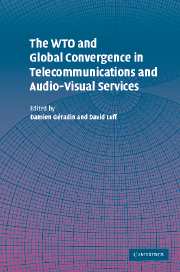Book contents
- Frontmatter
- Contents
- List of contributors
- Foreword
- Acknowledgments
- PART I Introduction
- PART II International regulation of telecommunications services
- 2 Telecommunications and audio-visual services in the context of the WTO: today and tomorrow
- 3 Current international trade rules relevant to telecommunications services
- 4 Accounting rates, cross-border services and the next WTO round on basic telecommunications services
- 5 Reforming international accounting rates: a developing country perspective
- 6 Levelling the playing field: is the WTO adequately equipped to prevent anti-competitive practices in telecommunications?
- PART III International regulation of audio-visual services
- PART IV Towards convergence?
- Index
6 - Levelling the playing field: is the WTO adequately equipped to prevent anti-competitive practices in telecommunications?
from PART II - International regulation of telecommunications services
Published online by Cambridge University Press: 25 February 2010
- Frontmatter
- Contents
- List of contributors
- Foreword
- Acknowledgments
- PART I Introduction
- PART II International regulation of telecommunications services
- 2 Telecommunications and audio-visual services in the context of the WTO: today and tomorrow
- 3 Current international trade rules relevant to telecommunications services
- 4 Accounting rates, cross-border services and the next WTO round on basic telecommunications services
- 5 Reforming international accounting rates: a developing country perspective
- 6 Levelling the playing field: is the WTO adequately equipped to prevent anti-competitive practices in telecommunications?
- PART III International regulation of audio-visual services
- PART IV Towards convergence?
- Index
Summary
Introduction
On 15 February 1997, sixty-nine WTO Members reached an agreement, taking the form of a protocol to be attached to the General Agreement on Trade in Services (GATS), whereby they would open to foreign competition some or all of their basic telecommunications services markets. This agreement, the ‘Agreement on Basic Telecommunications’, came as a result of several years of negotiation, and was welcomed as a major breakthrough in the liberalisation of basic telecommunications services. TheAgreement is of considerable importance, as its sixty-nine contracting parties represent over 90 per cent of theworld's basic telecommunications revenues.
While the removal of barriers to entry into the telecommunications markets is a major step forward, it might not be sufficient in itself to create thriving competition in such markets. As will be seen below, this is because the telecommunications sector has a certain number of features that allow the incumbents to retain a substantial degree of market power. Controlling market power in telecommunications is usually achieved through a combination of competition rules and sector-specific legislation. In the European Union, for instance, the telecommunications sector is extensively regulated by a set of detailed directives. In addition, the EC competition authorities have often intervened to prevent abuses of market power on the part of the incumbents. Not all contracting parties to the Agreement on Basic Telecommunications, however, possess adequate tools to control market power in their telecommunications market. This raises the question of whether the WTO is able to provide remedies to foreign telecommunications operators suffering from abuses of market power on the part of the local incumbent. This issue is the theme of this paper.
- Type
- Chapter
- Information
- Publisher: Cambridge University PressPrint publication year: 2004
- 5
- Cited by

